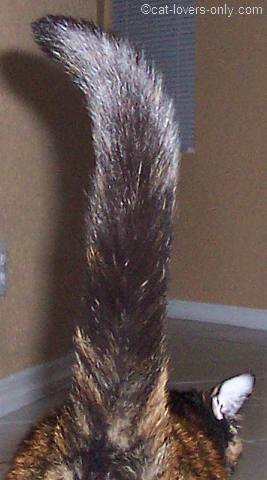Feline Constipation
Feline constipation is a relatively common problem and may affect cats of any age. For mild cases, laxative therapy may help.
Cats usually become more prone to this problem as they age, or become less active. The most common cases of constipation in cats are seen in middle aged to older males.
Domestic Shorthair, Domestic Longhair, and Siamese are the biggest targets in terms of breed. In order to understand things better, let's define what we mean by constipation, and normal and abnormal bowel movements.
Normal vs. abnormal: normal goes something like this...
Most cats will have a bowel movement once or twice per day. Other cats are less frequent and may be on an every other day schedule. If your cat has no other health problems, and the pattern remains fairly constant, then your vet may consider either of these two scenarios "normal."
Feline constipation goes more like this...
 Teddie suffers from constipation from time to time.
Teddie suffers from constipation from time to time.If your cat is suffering from constipation, however, the pattern may change.
The usual scenario is a period of delayed, smaller volume (often pebble-like), or total lack of, bowel movement.
Attempts at, or successful defecation may or may not be painful.
Some cats may have intermittent diarrhea or bloody stool throughout this time.
Periods of constipation may last less than a day, or can be as long as several months. Litter box behavior may change in obvious ways during this time.
It is easy for a cat owner to mistake this change for a behavioral litter box problem. Be alert that if your cat exhibits any change in litter box usage, constipation may be at fault.
For example, some cats will simply sit in the box for some time, apparently making no attempt to defecate. Sometimes the behavior includes multiple attempts to defecate, but with no results. Some cats will visit the box every few minutes and just move the litter around.
Other cats will exhibit behaviors that indicate they are truly uncomfortable. This may include howling or crying before, during, or after these attempts. Straining while in the box may be evident.
Your cat may associate litter box usage with pain, and stop using it, even after the constipation subsides. A retraining may be in order here. Never scold or punish your cat for not using the litter box - it won't help.
Even if you don't notice a behavior change, you may be able to tell if your cat has been having trouble with her bowels.
Evidence of feline constipation can be seen in the feces both inside, and possibly outside, the litter box. The feces may be unusually dry, hardened, and often of small diameter.
Due to an often prolonged inability to defecate, feline constipation may lead to or result in other systemic issues... these might include lethargy, vomiting, anorexia, and weight loss.
Since hairballs are a common cause of feline constipation, hairball remedies, additional fiber in the diet, and increased water consumption may help resolve the problem. If your cat is constipated, your vet can map out a course of treatment for you to follow.
Vomiting and Constipation
If your cat is also vomiting, this could indicate a more serious condition. Vomiting is a symptom of many ailments, so your veterinarian will have to get involved to pin it down.
Severe hairballs can cause vomiting, including vomiting foam and a little liquid and nothing else. Hairballs can also contribute to constipation, but without a diagnosis from your vet, there's no real way to know the cause.
The bottom line here? If your cat is demonstrating signs of constipation, including straining to poop and is also throwing up, I'd see the vet.
Causes of Constipation in Cats
As part of the normal digestion process, water is reabsorbed into the body in the large intestine. If your cat is dehydrated, or waits too long to poop, there's not enough water left, and the stool becomes dry and hard.
Therefore, anything that causes dehydration or your cat to hold her stool in longer, such as litter box aversion or your cousin's week long visit, can lead to constipation.
Here are some possible physical causes
- Hairballs and fur in the gut
- Change (a move, boarding, strangers visiting)
- Lack of water consumption or dehydration
- Hospitalization or surgery
- Travel
- Old age, illness, or mobility problems
- Inaccessible litter box
- Lack of exercise
- Consuming indigestible or foreign items
- Stress
- Intestinal blockage
Diagnosis
For proper diagnosis, your veterinarian may do a full examination, including blood work, urinalysis, X-rays or ultrasound. For short term bouts of constipation, however, I have found that most vets will simply prescribe a laxative.
If it becomes chronic, severe, or the initial treatment doesn't work, however, be prepared for the full array of testing.
Some cats may develop megacolon, a condition where the cat's colon stops functioning properly. If things get bad enough, your cat may develop obstipation, which is a blockage of the intestines, and may require surgery.
Home Remedies for Feline Constipation
Here's a simple home remedy for cat constipation problems.
At the most basic level, the remedy is to soften the stool or move it along with some sort of laxative, and increase your cat's water consumption. One way to do that is to offer your kitty moving water with a drinking fountain.
Another is to use this simple trick from one of our readers to get your cat to drink more water.


Comments: What do you think?
Have your say about what you just read. Leave me a comment in the box below.